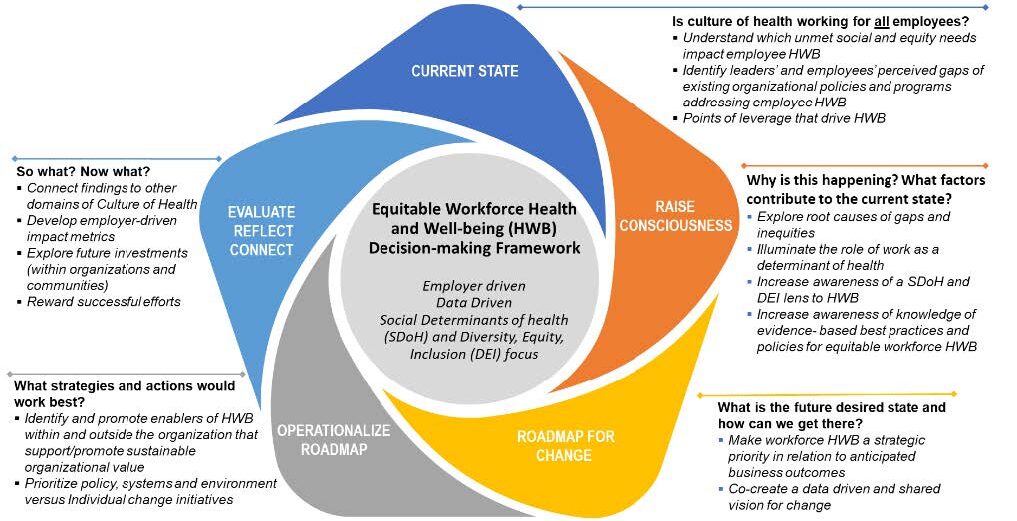Workforce Health and Well-being for All as a Sustainable Business Strategy
Employers are key stakeholders in creating an equitable and healthy future of work and must recognize their role in contributing to workforce and population health.
Intro

Recent research has provided new insights into the quantitative association between workforce well-being and business performance outcomes across a broad array of industries. Effective linkages between employee-level data and individual-or workgroup-attributable business outcomes have the potential to provide a basis for strategic business planning, recognizing the workforce as an organizational asset –and identifying workforce health and well-being interventions that can favorably impact business outcomes and employee health.
The Workforce Health and Well-being for All as a Sustainable Business Strategy project aims to develop and implement a data-driven workforce health and well-being decision-making framework that identifies and addresses social determinants of health, diversity, equity, and inclusion (DEI) factors. With this approach, a culture of health, including Total Worker Health for all employees can be more meaningfully realized –with the goal of linking workforce health and well-being to business performance measures.
Description

Workforce Health and Well-being for All as a Sustainable Business Strategy project is collaborating with a healthcare system on this study. The healthcare system employs 13,000 individuals. The project will address benefits design, wage structure, and culturally appropriate and accessible well-being programs that can significantly mitigate health inequities – and measurably enhance business performance.
The project team will work with both leadership and workers to develop inclusive workforce health and well-being interventions. Using the Equitable Workforce Health and Well-Being Decision-Making Framework.
Our Research
Publications
| The Importance of Human-centered Design in Equitable Health Promotion Initiatives | Sherman, B.W., Stieh, E., Gupta, R., Pratap, P.L.. The Importance of Human-centered Design in Equitable Health Promotion Initiatives. American Journal of Health Promotion. 2024;38(3):443-447. doi:10.1177/08901171241232057f |
| Unique Barriers to Workplace Health Promotion Programs by Wage Category: A Qualitative Assessment of Secondary Data | Stiehl, E., Bales, S., Jenkins, K. R., & Sherman, B. (2022). Unique Barriers to Workplace Health Promotion Programs by Wage Category: A Qualitative Assessment of Secondary data. American Journal of Health Promotion, 36(5), 843–852. doi.org/10.1177/08901171211069546 |
| Why Don't Employees Participate in Well-being Programs? A Research-Informed Systems-Based Model | Sherman, B. W., Stiehl, E., Wator, C., & Pratap, P. L. (2024). Why Don’t Employees Participate in Well-being Programs? A Research-Informed Systems-Based Model. Journal of Occupational and Environmental Medicine, 66(2), 156. doi.org/10.1097/JOM.0000000000003012 |
| Workplace Culture of Health and Equitable Workforce Well-Being: A Scoping Literature Review | Gupta R., Stiehl E., Wator C., Pratap P.L., Sherman B.W.. Workplace Culture of Health and Equitable Workforce Well-Being: A Scoping Literature Review. American Journal of Health Promotion. 2025;0(0). doi:10.1177/08901171251326316 |

